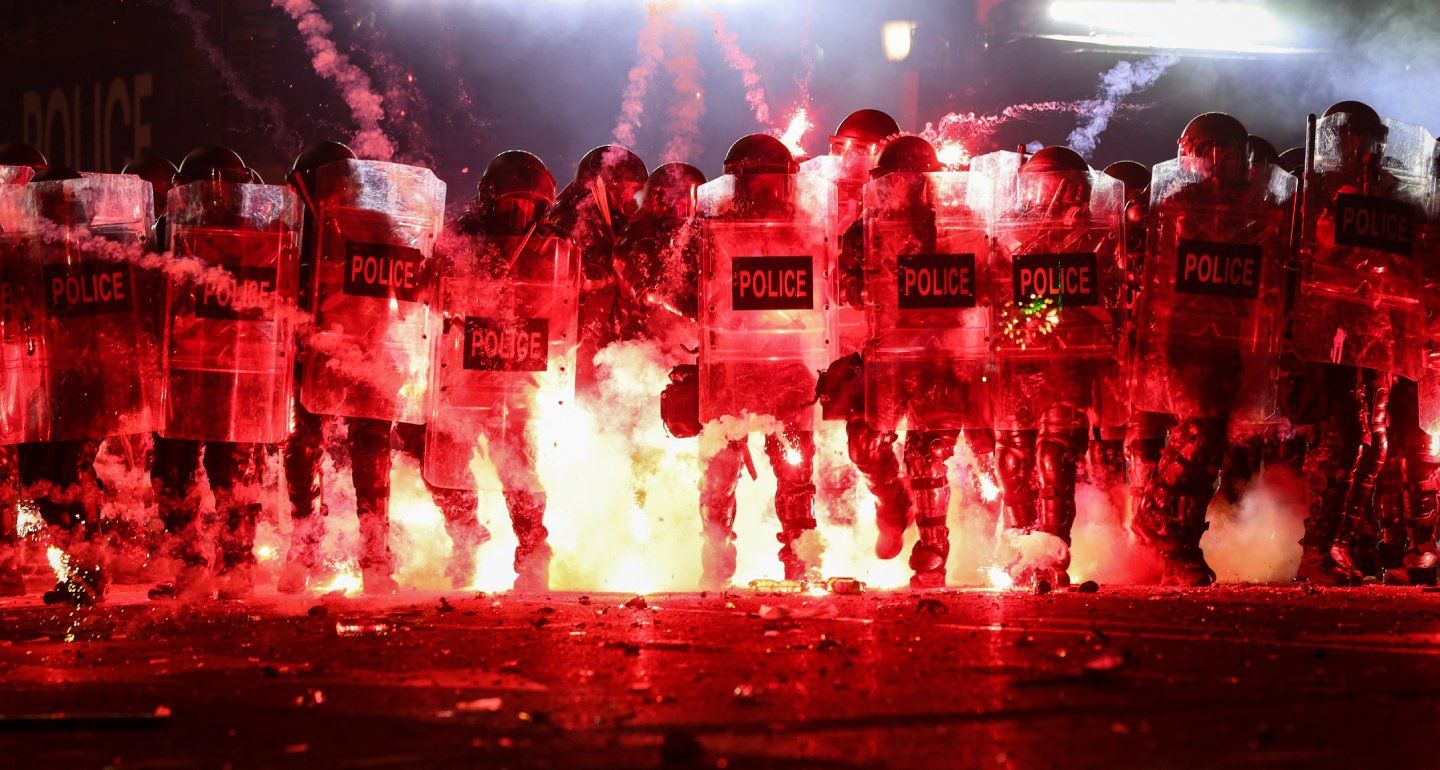Western negotiators often believe territory is just a bargaining chip when it comes to peace in Ukraine, but Putin is obsessed with empire-building.
Andrey Pertsev
{
"authors": [
"Olesya Vartanyan"
],
"type": "commentary",
"blog": "Carnegie Politika",
"centerAffiliationAll": "",
"centers": [
"Carnegie Endowment for International Peace",
"Carnegie Russia Eurasia Center"
],
"englishNewsletterAll": "",
"nonEnglishNewsletterAll": "",
"primaryCenter": "Carnegie Russia Eurasia Center",
"programAffiliation": "",
"programs": [],
"projects": [],
"regions": [
"Georgia",
"Caucasus"
],
"topics": [
"Civil Society",
"Political Reform",
"Domestic Politics"
]
}
Bidzina Ivanishvili, Georgia’s enigmatic billionaire powerbroker, appears fixated on Western reactions while ignoring the mass protests engulfing his nation.
Each evening in Tbilisi, crowds converge on Rustaveli Avenue, the city’s central artery. By nightfall, tens of thousands fill the streets in a defiant display unseen in Georgia’s thirty-three years of post-Soviet independence.
The protests transcend demographics. Students march alongside elderly pensioners. Young professionals mingle with women clutching designer handbags. Even smaller, traditionally quiescent cities are staging rallies. Petitions denouncing the government circulate widely, while high-ranking officials announce resignations.
The spark for this unrest was Georgian Dream’s November 28 decision to halt the country’s European integration—a process years in the making. Only a year earlier, Georgia had secured EU candidate status, a milestone that bolstered the aspirations of a population overwhelmingly supportive of the European project.
Russia’s invasion of Ukraine had catalyzed Georgia’s European ambitions, making EU membership feel imminent. Yet the ruling party’s abrupt reversal, seen as a betrayal, has sparked fears that Georgian Dream is steering the country closer to Moscow.
Georgia’s fraught history with Russia only deepens those anxieties. The brief war between the two countries in 2008 ended with Moscow recognizing the breakaway regions of Abkhazia and South Ossetia, effectively severing diplomatic ties.
Yet under Georgian Dream, links have quietly flourished. Trade has expanded, and in 2023 Russia lifted visa requirements for Georgian nationals, fueling accusations that the ruling party was shifting closer to the Kremlin.
The timing of Georgian Dream’s reversal on European integration has bewildered many. As one former minister told me at a protest, “You didn’t need a crystal ball to predict the backlash.” Polls consistently show that Georgians overwhelmingly support EU membership, viewing it as a path to security and prosperity.
Despite the scale of the protests, Georgian Dream has tried to downplay their significance. On December 14, the ruling party is set to install Mikheil Kavelashvili, a loyalist and former footballer, as the next president, via a vote by a college of electors.
That would bring an end to the term of Salome Zourabichvili, the incumbent president and a vocal supporter of the protests. But Zourabichvili has vowed to remain in office until snap parliamentary elections are called, setting the stage for what could be a dramatic showdown.
Under the leadership of Bidzina Ivanishvili, a billionaire businessman who made his fortune in post-Soviet Russia, the Georgian Dream party seems largely indifferent to domestic reactions when pursuing risky decisions. In 2024, the party has careened from one crisis to another.
In the spring, it faced widespread public opposition to a Russian-style foreign agent law, which the government ultimately passed. Simultaneously, Ivanishvili adopted rhetoric reminiscent of Russian propaganda, accusing “global parties of war” of pressuring Georgia to open a second front against Moscow. In the fall, Georgian Dream declared victory in parliamentary elections marred by fraud allegations, dismissed by both local opposition and Western partners as illegitimate.
Despite repeated threats of sanctions and severe consequences, Ivanishvili and his party have faced little more than critical statements and the suspension of Western financial aid: measures that have failed to disrupt Georgia’s political status quo.
In Washington, preoccupied with the incoming Trump administration, policymakers refrained from imposing sanctions on Ivanishvili even after the contested elections. Nor did they take steps to pressure the billionaire into reconsidering his position.
The EU, while declining to recognize the election results, prepared to send a technical mission widely seen as a move to save face while preparing to accept the disputed outcome. Other Western partners have remained cautious, unwilling to sever ties with Georgia’s leadership for fear of pushing the country further into Russia’s orbit—a concern frequently voiced by Western diplomats.
Ivanishvili has long understood the importance of Western opinion. His own rise to power over a decade ago proved that protests lacking Western recognition can be safely ignored. So far, Ivanishvili has deftly steered through every crisis. But the current turmoil may prove beyond his control.
The first three days of protests were the most intense, marked by police indiscriminately charging at demonstrators, enraged by their chants. Special forces fractured skulls and broke bones, with journalists, women, and the elderly among the injured.
Protesters quickly adapted, using masks to endure tear gas. Early on, demonstrators attempted to discombobulate the police with fireworks and smoke bombs, but those tactics quickly dwindled after the authorities banned the sale of pyrotechnics and sealed opposition supplies.
In recent days, relative calm has prevailed, largely due to an unspoken public consensus that whatever happens, the protests in central Tbilisi must remain peaceful. Georgia’s history looms large. The city center was scarred by civil war in the early 1990s, with tank battles and gunfire on Rustaveli Avenue.
That conflict not only caused hundreds of deaths and widespread destruction, but also led to years of instability and a period of turmoil that contributed to Georgia’s defeat in the Abkhazian war. Both Georgian Dream and the protesters are determined to avoid what many now refer to as a “second Maidan.”
But how long this fragile balance can be maintained is uncertain. The protests remain leaderless and spontaneous, and the situation is becoming harder for Georgian Dream to control. A single gunshot on Rustaveli Avenue could plunge Georgia into a far more volatile and unpredictable reality.
Western partners, whose views Ivanishvili values, could be pivotal in resolving the crisis. The Baltic states have already imposed entry bans on Georgian Dream leaders. France, Germany, and Poland, while focused on domestic issues, elections, and preparations for the EU presidency, respectively, have begun engaging with the situation in Georgia. The United States has raised the prospect of sanctions in response to the use of force against demonstrators.
The key question for Western capitals is whether these measures will compel Georgian authorities to enter into dialogue or simply escalate the crisis. As one European diplomat put it, no one wants a “new Belarus” in the South Caucasus, with Ivanishvili assuming the role of a second Alexander Lukashenko.
Avoiding such a scenario may depend on Georgian Dream’s willingness to take the protests seriously and enter into negotiations with the opposition and civil society. For that to happen, Ivanishvili must first believe that the West is genuinely concerned and prepared to act. Only then, when he senses a true threat to his position, will the path to dialogue become a realistic option.
Carnegie does not take institutional positions on public policy issues; the views represented herein are those of the author(s) and do not necessarily reflect the views of Carnegie, its staff, or its trustees.
Western negotiators often believe territory is just a bargaining chip when it comes to peace in Ukraine, but Putin is obsessed with empire-building.

Andrey Pertsev
The story of a has-been politician apparently caught red-handed is intersecting with the larger forces at work in the Ukrainian parliament.

Konstantin Skorkin
For years, the Russian government has promoted “sovereign” digital services as an alternative to Western ones and introduced more and more online restrictions “for security purposes.” In practice, these homegrown solutions leave people vulnerable to data leaks and fraud.

Maria Kolomychenko
It’s one thing to export Russian helicopters to Iran to fight the insurgency, and it’s easy to imagine Moscow becoming a haven for fleeing Iranian leaders. But it’s very difficult to imagine Russian troops defending the Iranian regime on the ground.

Nikita Smagin
While appointing Kyrylo Budanov will help shore up Zelensky’s political authority and balance the president’s inner circle, the spy chief’s political ambitions mean he could be a threat.

Konstantin Skorkin